In pre-Roe hearings, Pa. women described their anguished, resolved search for an abortion
Sylvia Stengle’s parents raised her in a sheltered, postwar-era household, and she said like most people of that time, she grew up “in oblivion” when it came to sexuality and reproductive health care.
Yet, often embedded within the silence were accounts of generational suffering, she said. Stengle’s family and that of the man she married were no exception.
Stengle’s grandmother suffered from diabetes, a condition that at the time made childbearing dangerous for her. She conceived and lost her life during pregnancy, when Stengle’s mother was just 10 years old. And her husband’s grandmother, desperate for a hysterectomy after her many pregnancies, traveled across Canada to find someone who would perform the surgery. She returned home in a casket, Stengle said.
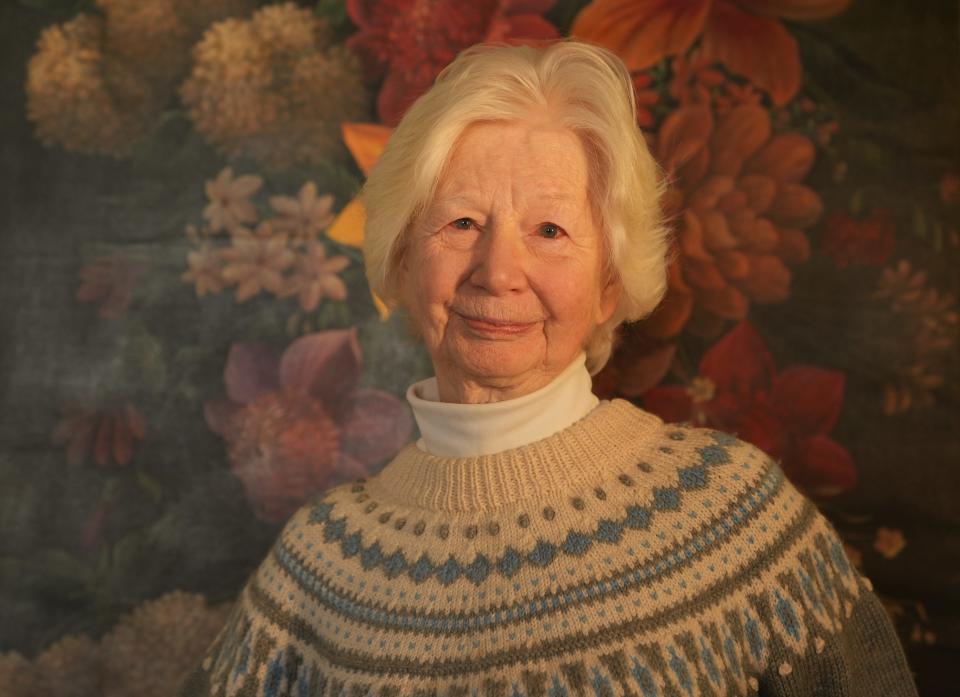
As an adult, Stengle wanted to bring these types of hushed conversations into the open. By then, the Midwest native had become an abortion rights activist in central Pennsylvania. So in 1972, when she heard that a governor-appointed abortion commission was holding a meeting in her area, she made the decision to attend.
Transcripts from the Harrisburg hearing show she didn’t go before the Pennsylvania Abortion Law Commission to unload the facts and statistics she’d picked up as an advocate. The panel would get plenty of that, she said. Instead, Stengle wanted to share what she called her "reproductive autobiography."
“Baring my autobiography is painful, so painful that I am not sure I can do it effectively,” she hesitated as she started her testimony. But she’d concluded that only through “an honest appraisal of what actually happens and what actually results from our customs and legislation … can we make wise decisions for change.”
Then, she began her story.

Excerpt from Sylvia Stengle’s testimony to the commission on Feb. 9, 1972
While I was nursing my second child, I conceived. … I didn't think when you were nursing that you could conceive. And I had not yet been fitted for a diaphragm.
I needed an abortion.

It was the second of four hearings held by the 23-member commission, an all-female panel that traveled the commonwealth the year before Roe v. Wade established a national abortion rights standard that endured for almost five decades. Before then, Pennsylvania’s abortion law criminalized any attempts to terminate a pregnancy “unlawfully,” and the commission was charged with studying the policy and its consequences.
At the conclusion of the listening tour, the panel’s majority recommended that the commonwealth remove sanctions for abortion and declared that the procedures should be safe, low-cost and “a matter of choice for all women.”
Stengle was among a small group of women who testified to the commission about their experiences searching for an abortion provider, enduring hours’ long journeys to access services and, in some cases, resorting to unsafe back-alley procedures.
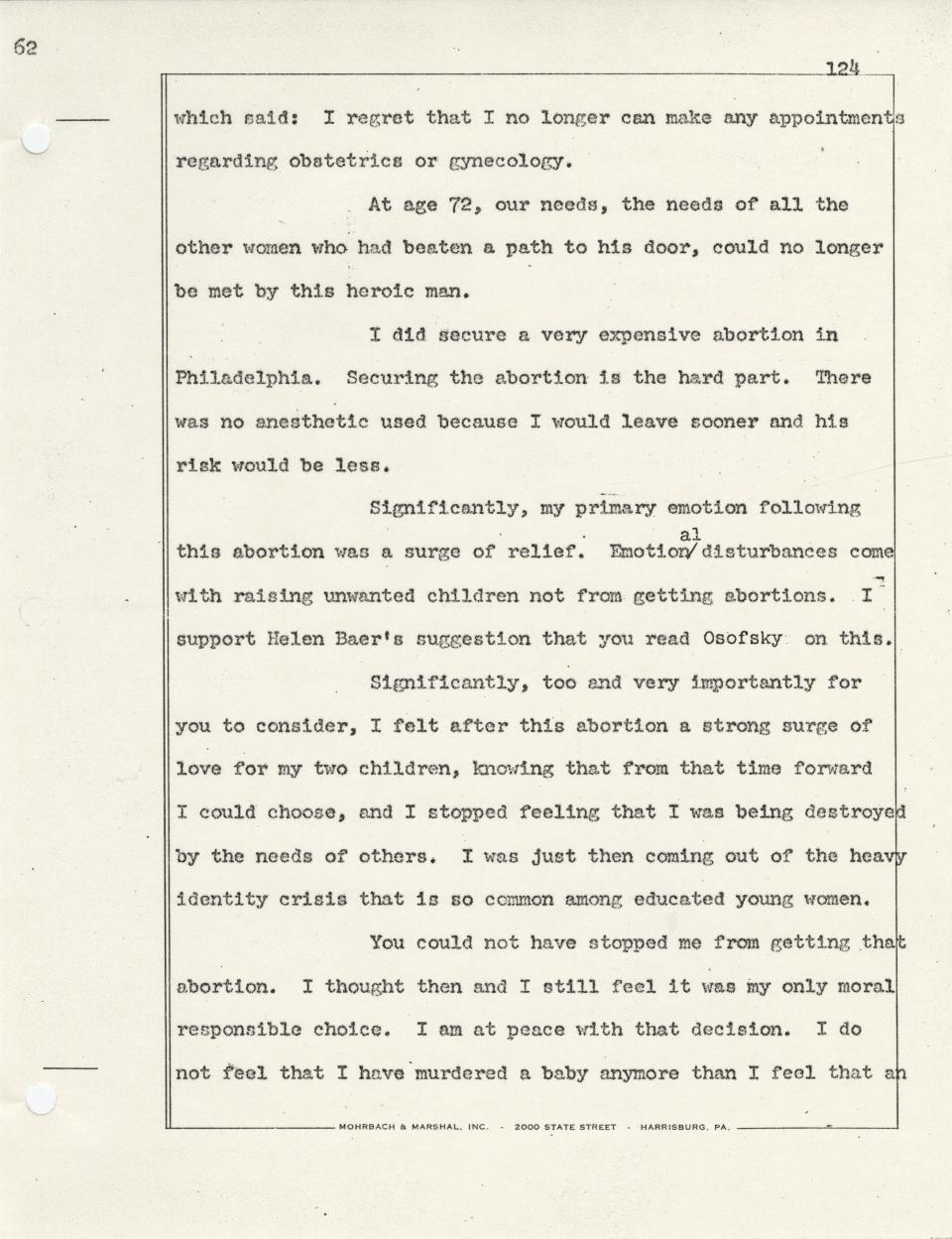
For a handful of these women, their adulthood would span the 50 years that Roe v. Wade held sway. And now, after last year’s Supreme Court decision overturning the landmark ruling, they’ve lived to see states curb abortion access the way it was during their youth, with some lawmakers eager to do the same in Pennsylvania.
The fragility of the Roe ruling dawned on Stengle gradually during her years as an advocate and abortion clinic director, she said in a recent interview from her New Jersey home.
“I believed we had had a success that would last,” she said. “And I can't remember when it became clear that that wasn't real.”
‘A different kind of pain’
Stengle had recently given birth to her second child when she realized she’d conceived again.
She hadn’t meant to, she told the commission in 1972; she didn’t know she could become pregnant while nursing, and speaking before the panel, she upbraided herself as “stupid” for the misunderstanding. For her own sake and the good of her family, she concluded that she should terminate the pregnancy.
"It was so soon after the child I had just had," she said in a recent interview. "And for the well-being of the children that I already had, it seemed like the right thing to do."
But it was 1964 and difficult to find anyone who could provide an abortion. Lead after lead took her to a dead end, she said.
She drove to a Schuylkill County coal town home to a famous doctor, nicknamed the “Angel of Ashland” for performing thousands of illegal abortions across many decades. When Stengle arrived, though, the sign on the medical office door informed her that the doctor, then in his 70s, was no longer scheduling obstetric or gynecological appointments.
She eventually found a physician in Philadelphia who would perform an abortion for her, but it was extremely expensive, she said in her testimony. The doctor was nervous about being caught — telling Stengle that anesthetizing her during the procedure would take too long and increase his risk.
But she doesn’t remember the abortion being physically painful.
“It was a different kind of pain,” she recalled in a recent interview. “It was the pain of having to struggle so hard to find care that felt safe.”
After the procedure, she experienced a “surge of relief,” she told the commission. Decades later, relief is still the word she chooses to describe her emotions that day.

Carol, graduate student at Pennsylvania State University, spoke at the commission’s Harrisburg hearing on Feb. 9, 1972
Five years ago I carried through an unwanted and unwilling pregnancy to term. After nine months of carrying this child and holding it and all the other emotional burdens that go with pregnancy, I had to surrender this boy baby, as the legal papers saluted it, for adoption. I could not prove to anybody that this child was really unplanned and unwanted. I was slipped a mickey, and without a witness in the State, I was unable to prove rape.
Now I have had a lot of psychological and traumatic repercussions from this experience. I was determined that I was not going to be forced into this situation again.
Since that time I have been using the pill. I developed complications. The dosage I was on was too heavy. I was prescribed a lighter dosage, in fact the lightest on the market. This November I found that I was pregnant.
After a frantic search, I was able to locate 10 places where I could get an illegal abortion in the State. Three of them were doctors. Seven of them, I don’t even know what they were.
I also have five bottles of castor oil sitting on my bathroom shelf. I was willing to take them if I had to.
Fortunately, however, I was referred to Clergy Counsel Service. This service referred me to a medical service, New York Women’s Service, and it was the most unique medical service that I ever encountered. I was treated as a human person.

‘Arbitrary restrictions were common’
The commission found that, in the early ‘70s, a patchwork of abortion practices existed across Pennsylvania, which had restrictive-but-confusing laws against the procedure.
People who lived near major hospitals had a better chance of gaining access, but that wasn’t guaranteed due to a panoply of rules that health institutions used to fill gaps in the state law.
“A woman calling the hospital found evasion, rejection or encouragement, depending on where her call was referred,” Dr. John Franklin, a Philadelphia obstetrician, testified. “Arbitrary restrictions were common.”
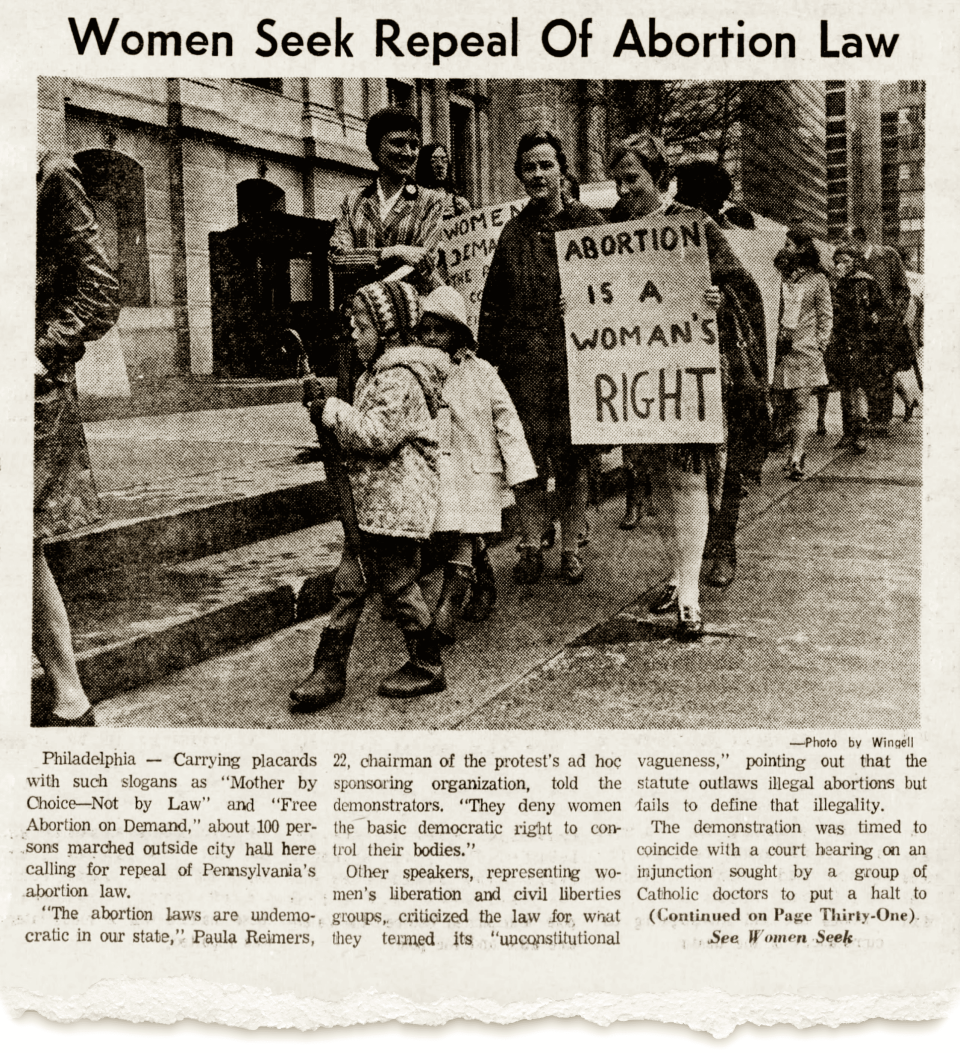
And a majority of Pennsylvania’s hospitals turned away women who didn’t live in their communities, or “catchment areas,” while the remaining medical centers maintained tight quotas on the number of abortions they could perform, a Philadelphia social worker testified.
Small cities or rural areas offered “virtually no medically safe abortion services except referral,” the commission’s report stated.
A representative from a new New York abortion clinic told the panel that nearly 350 Pennsylvania women, representing about a quarter of their clients, had come to their offices in the few months since they’d opened the facility. Some women contemplated traveling as far away as Puerto Rico, the commission learned.
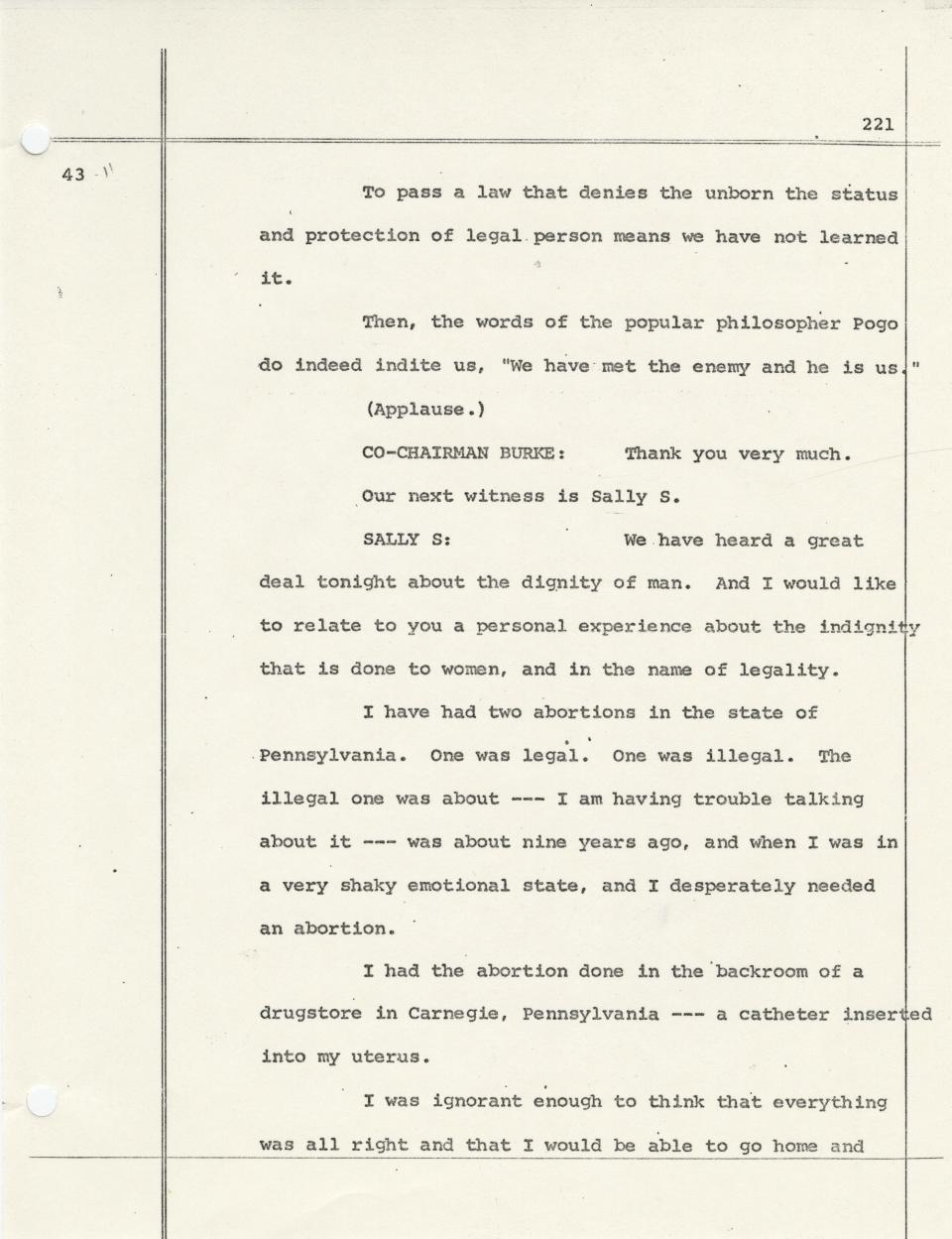
But women who couldn’t afford a hospital abortion or lived in rural areas and didn’t have money to travel out of state sometimes resorted to dangerous options.
Women spoke about seeking help from people who claimed to be physicians but whose medical credentials were in doubt. They testified about getting abortions with few or no painkillers, paying the provider with envelopes stuffed with cash and leaving without any plan for follow-up care.
And because of the possible legal repercussions, a couple women said they or their families were terrified to seek medical help in the aftermath of their abortions, even when their lives seemed at risk.

Sally spoke at the commission’s Pittsburgh hearing on March 14, 1972
I have had two abortions in the state of Pennsylvania. One was legal. One was illegal. The illegal one was about – I am having trouble talking about it – was about nine years ago, and when I was in a very shaky emotional state, and I desperately needed an abortion.
I had the abortion done in the backroom of a drugstore in Carnegie, Pennsylvania – a catheter inserted into my uterus.
I was ignorant enough to think that everything was all right and that I would be able to go home and have a normal miscarriage.
Unfortunately, when I got home I began to hemorrhage, and the pharmacist had not told me what to do in this event, and my husband was very frightened and wanted to take me to the hospital.
Now, to show the force of what these laws can do – my own mother stood in the door as my husband was trying to carry me out, as I was literally bleeding to death — “Don’t take her to the hospital. Someone will find out. It is against the law. We will get in trouble.”
At any rate, my husband got me to the hospital, and with the proper medical procedures, transfusions, etcetera, I was all right.
I have since had a child 18 months old and I love him very much, and I have had a legal abortion which was about a year ago.
I was able to arrange a legal abortion at West Penn Hospital which was only mildly humiliating, in the sense that I had to convince the social worker that I was crazy and that I could not support another child, unplanned for and unwanted.

‘The pressures … are terrific’
A minority of the abortion commission members wrote their own report to the governor, exhorting him not to support legalizing the procedure.
“We have searched our hearts and our souls for the wisdom and the tolerance you asked us to bring to our deliberations, and, in the words of one of the most memorable witnesses we heard during our four days of public testimony, we ‘opt for life’!” the members said.
During the hearings, some worried that because of the social stigma around single motherhood, women were feeling coerced by their families or partners into terminating their pregnancies.
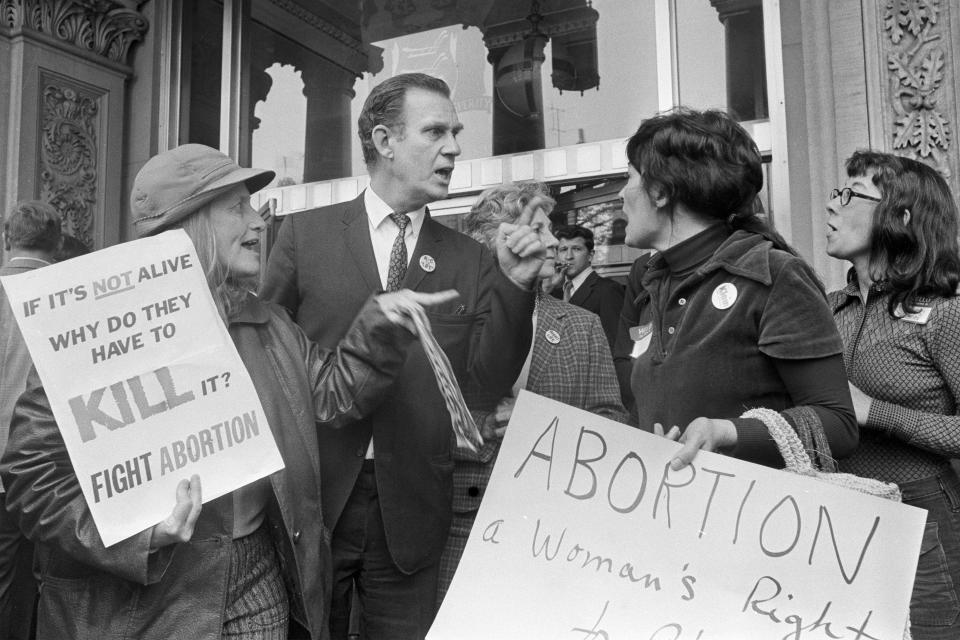
One abortion opponent testified that people in her life had pushed her to end two pregnancies. A minister had accused her of having a behavioral problem because she was a single mother and wanted to go to court for child support.
“The pressures on pregnant girls are terrific,” she said. “If legalized abortion is to be the thing of the new morals, what choice will there be?”
Another woman spoke about the guilt she felt after seeking an abortion. The doctor, whom she learned about from her co-worker, had given her an injection and then asked her to “have sexual relations with him to bring on the abortion.” The woman said she left terrified.
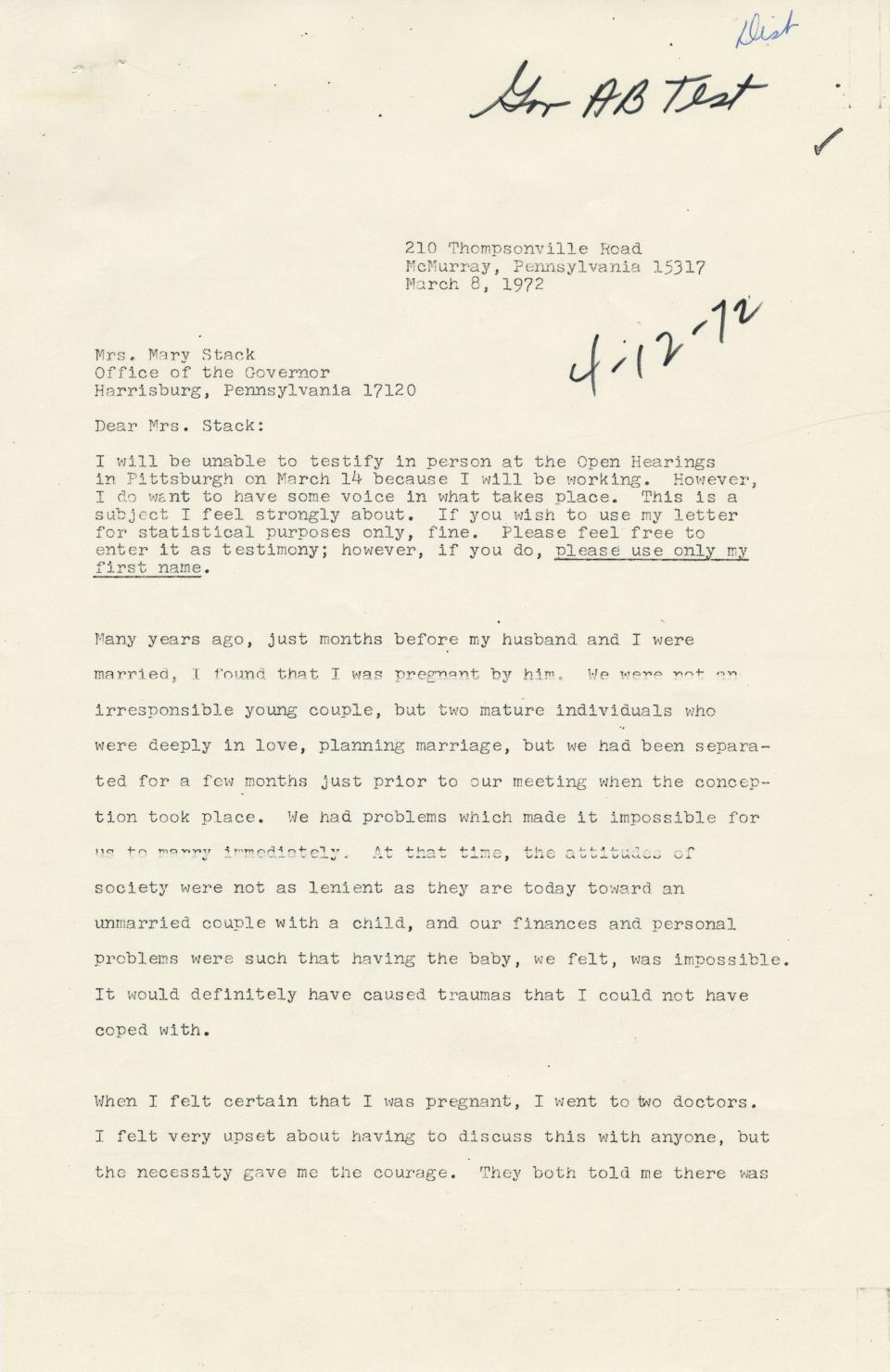
The abortion was unsuccessful, and the woman later gave birth to a daughter. Still, she told the commission, she went through a period of mental turmoil because she’d tried to end her pregnancy.
But physicians, social workers and many of the women who testified about undergoing an abortion said in general, the procedure itself wasn’t causing emotional distress. What was traumatizing, they said, was having to sneak around — and sometimes break the law. It was the social stigma, and it was the shoddy medical treatment they might endure.

Joyce, unable to attend the Pittsburgh hearing, wrote a letter to the commission
Many years ago, just months before my husband and I were married, I found that I was pregnant by him. We were not an irresponsible young couple, but two mature individuals who were deeply in love. We had problems which made it impossible for us to marry immediately. At that time, the attitudes of society were not as lenient as they are today toward an unmarried couple with a child, and our finances and personal problems were such that having the baby, we felt, was impossible. It would definitely have caused traumas that I could not have coped with.
When I felt certain that I was pregnant, I went to two doctors. I felt very upset about having to discuss this with anyone, but the necessity gave me the courage. They both told me there was nothing they could do, and wished me luck. Literally!
We called a friend in another state, who told us of a doctor in still another state that she knew of. Many secret arrangements were made, and we set off on a nine-hour drive. When we arrived (at night) we met him at a bar, and he had us drive him to a certain motel. He claimed to be a legitimate M.D., but that he couldn’t perform the abortions in his office as he was being watched. My husband gave him $150, and the procedure began. I don’t know who but another woman who has been through it, can imagine the damage this does to one’s self-esteem and sense of worth, what guilts and traumas it carries with it, the deceit that it entails. It was truly a back-alley abortion.
It was not possible for me to stay overnight, although the doctor recommended it highly. Instead, I lay in the back of my husband’s station wagon, and drove the nine hours back to Pittsburgh. The rough ride had caused the tubing to fall out, and after all of this, we didn’t know if it would work. I was in such pain when I arrived home, I went to bed. Four days later, I aborted. Then infection set in, and I ended up in the hospital anyway (where I should have been in the first place) but this time “legitimately.” My doctor stated that I had miscarried.
It took me a long time to smooth over the scars. Not of aborting a fetus, but of the methods we were forced to use. If this could have been handled in a mature way, if I could have discussed this in my doctor’s office as I would any other problem that would cause physical and mental changes, if I could have felt like a decent human being with a problem, instead of sneaking around for less than perfect solutions, I would have been most grateful.

‘Breaking the silence’
Stengle embarked on abortion advocacy by convening a group of feminists called the Lehigh Valley Abortion Rights Association. The group, she remembers, sent out press releases about their meetings, working conversations about abortion onto the pages of newspapers that had previously shied away from the topic.
“I was breaking the silence,” she said.
She was about two years into this mission when she testified to the abortion law commission.
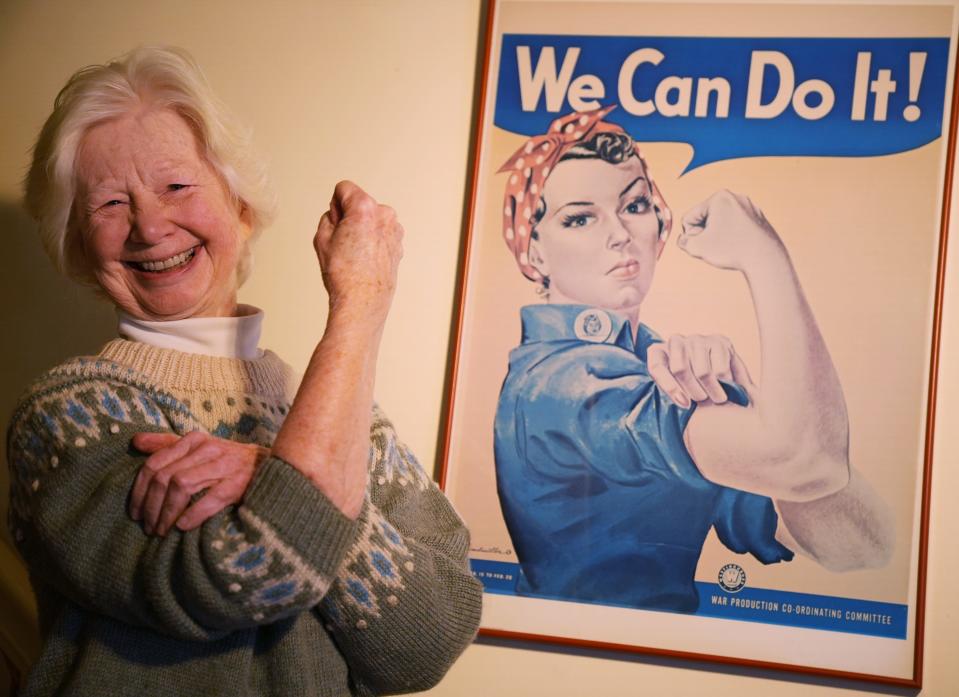
As Stengle pressed forward with raising awareness, phone calls started trickling in from people asking where to go to terminate a pregnancy. Her group began identifying clinics in New York, where abortion was legally available, and referring people to them.
That early work launched Stengle into a lifetime in reproductive health care and activism.
She went on to open two clinics, fighting zoning battles meant to shut out the centers and — in what she calls a “moment of triumph” — keeping her facility running even after anti-abortion protestors chained themselves to a wooden pole in her waiting room.
She spent years leading the Allentown Women’s Center and served as director of the National Abortion Federation.
Then, at the age of 83, from her home in Princeton, New Jersey, she watched the Supreme Court abolish Roe v. Wade in last year’s Dobbs decision.
She said she was saddened but not terribly surprised. Over the years, anti-abortion activists had scored smaller victories across the nation by adding layer after layer of restrictions to the procedure. She saw those efforts as “waves of repression” that continued to beat against the long-standing precedent set by the Supreme Court in 1973 and said she spent her career trying to keep them at bay.
“All the time I was doing this work, I was thinking of it as a thumb-in-the-dike goodness,” she said. “And then, sometimes, the floodwaters come through.”
Editors note: Testimony excerpts have been edited for length.
Bethany Rodgers is a government accountability reporter for the USA TODAY Network and can be reached at brodgers@gannett.com.
This article originally appeared on Bucks County Courier Times: 50-year-old testimony reveals what Pa. was like before Roe v. Wade

